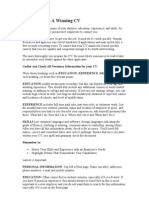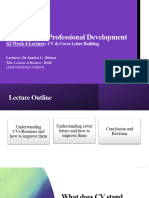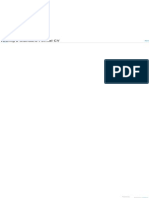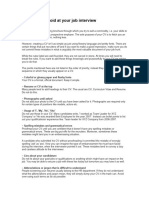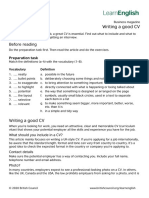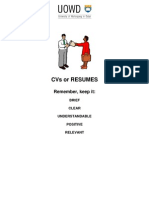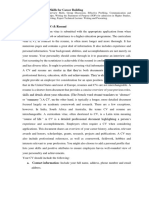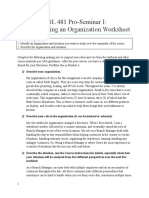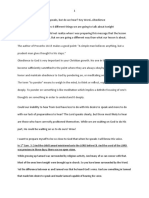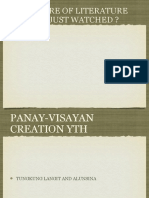When writing a CV, you should use a standard format that is easy to navigate
so the reader can easily find the information they are looking for.
The most common order of information on a CV is:
1. name,
2. personal details,
3. objective or executive summary,
4. education,
5. work experience,
6. skills,
7. personal interests,
8. publications,
9. references.
There are some variations in this order, such as placing publications before
personal details for academic CVs. For non-academic jobs, publications are not
as relevant.
A CV should be no more than two pages long, as this shows you can express
yourself clearly and concisely.However, longer CVs may be appropriate for
certain high-level jobs, especially in academia, where more space is needed to
describe projects.
A resume is a shorter version of a CV, typically one page long, that
summarises your objectives and main achievements. A resume is more like a
sales brochure, while a CV is more like a technical description of a product.
When writing a CV, you should highlight the skills and qualifications that are
relevant to the job you are applying for.
You should tailor your CV for each job you apply for, removing information
that is not relevant and adding information that is.
You should use keywords that are relevant to the job you are applying for, and
highlight them in your CV.
You should also be honest, accurate, and objective in your CV.
CVs are often checked for detail using special software (ATS), so any
discrepancies will be identified immediately.
Experienced recruiters can also easily spot a lie (bullshit).
�You should use a professional email address that clearly differentiates your
first name from your last name. You should not use email addresses that
include your date of birth, names of favourite bands, or are a merge of your
first and second name.
You should avoid using colours, as they may be lost if the recruiter prints the
CV.
You should also avoid using logos, as they are distracting.
The best fonts to use are Arial, Calibri, and Verdana, in a size between 10pt and
11pt.
You should use plenty of white space between sections and paragraphs to
make the CV easier to read.
You should write dates in a clear and concise way, using the day as a number,
the month as a word, and the year in full.
You should not abbreviate years, but you can abbreviate months using the first
three letters (Jan, Feb, Mar).
For current positions, you should use "present" instead of the end date.
For previous positions, you should only include months if the period was short.
You should include your name at the top of your CV in a larger font size and
in bold.
You should also include your contact details, such as your phone number and
email address.
You can also include your date of birth and nationality, but it is not essential.
You do not need to include a postal address, names of family members, fax
number, social media addresses, military service status, or driving licence
details.
You can include a photo, but it should be professional and neutral, such as a
passport photo.A black and white photo is preferable as it prints better.
An Executive Summary is a short summary of your skills and qualifications
that can be placed at the beginning of your CV.
It should highlight your unique skills and achievements.
�You should use positive language in your CV, avoiding negative words such as
"bad," "error," "fault," "hate," "mistake," "never," "nothing," and "problem."
You should also avoid using jargon or technical terms that the recruiter may
not understand.
You should list your referees at the end of your CV, providing their name,
relationship to you, place of work, email address, and website.
If you are short of space, you can simply state "references available upon
request."
Recruiters may check your social media accounts, so you should ensure that
you limit who can access your pages or avoid posting anything that could give
a negative impression.
You should mention your teaching experience, even if it does not directly
relate to the job you are applying for, as it demonstrates valuable
transferable skills such as public speaking, explaining complex concepts,
managing people, preparing materials, and working within time constraints.
You should not include a separate section for "Communication Skills" as such
skills can be demonstrated throughout the CV in other sections like Work
Experience and Personal Interests.
The Personal Interests section is important as it gives the recruiter an idea of
your personality and interests outside of work. You should mention hobbies
that demonstrate positive qualities such as social conscience, leadership skills,
communication skills, responsibility, and creativity.
You should avoid mentioning hobbies that are solitary, nerdy, political,
religious, contentious, or that people tend to have strong opinions about.
You can include future experiences in your CV, such as volunteering or
internships, that you have arranged for the near future.
If you are a recent graduate and your CV looks empty, you can fill it up by
including relevant details about your work experience, even if it was in shops,
restaurants or hotels.
You should focus on the skills and responsibilities you gained in these roles,
rather than just listing your duties.
�You should also highlight how your work experience demonstrates your career
progression.
You can include your language skills in a separate section or under the Skills
section. If you are applying for a position in Europe, you can use the levels
from the Common European Framework of Reference for Languages. You
should be honest about your language skills and avoid exaggerating them. If
you are not sure of your level, you can get a qualified EFL/ESL teacher to give
you a quick test.
If you passed an English examination years ago, you can still mention it, but
you may want to omit the year.
You should try to get your English back to the level of the examination before
the interview. You only need to mention languages for which you have a basic
knowledge if the job specification specifically states that knowledge of that
language is useful or if your CV is relatively empty.





